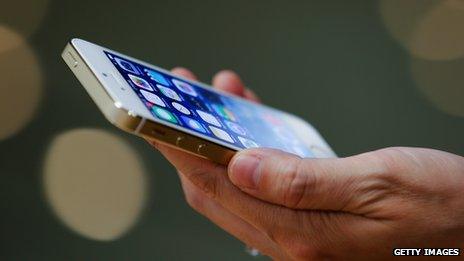Samsung to pay Apple $290m (£180m) for copying phones
- Published

A California jury found that Samsung used Apple designs in 13 older products
A Silicon Valley jury has ruled that Samsung must pay $290m (£180m) to Apple for copying iPhone and iPad features in its devices.
This verdict comes after a previous jury found Samsung owed Apple $1.05bn for patent infringement.
However, US District Judge Lucy Koh ordered a retrial because she said that jury miscalculated the amount Samsung must pay.
Samsung is expected to appeal.
Apple said in a statement: "For Apple, this case has always been about more than patents and money. It has been about innovation and the hard work that goes into inventing products that people love.
"While it's impossible to put a price tag on those values, we are grateful to the jury for showing Samsung that copying has a cost."
The jury's ruling covers 13 of the 26 Samsung devices that Apple had argued copied its technology. These are mostly older Samsung tablets and smartphones.
The $290m figure comes on top of the $550m Samsung owes Apple as a result of the initial verdict. In total, Apple has now been awarded close to $930m in the case.
Apple shares traded slightly higher on the news. Samsung closed down slightly earlier in the day.
'Beautiful and sexy'
Samsung had argued that Apple should not have ownership over technology like what Samsung said was the "basic rectangle" shape of smartphones.
"Apple doesn't own beautiful and sexy," Samsung lawyer William Price told the jury during the proceedings.
However, the jury in the courtroom - which is located just 15 minutes away from Apple's headquarters in California - thought otherwise, awarding close to the $380m Apple sought. Samsung said it owed just $52m.
Samsung was found to have infringed Apple patents, including one that allows users to "pinch and zoom" on smartphone and tablet screens.
A separate trial to determine whether or not current Samsung devices violate Apple's patents is scheduled for March 2014.
Apple has also asked Judge Koh to consider a sales ban against all of the older Samsung models that used Apple's technology.
While Judge Koh has previously refused to issue such an injunction, a separate US Appeals Court asked her to reconsider this week.
- Published18 November 2013
- Published12 November 2013
- Published28 October 2013